A Blog About Understanding The Toyota Production System and Gaining Its Full Benefits, brought to you by "The Toast Guy"


Improvement Begins with I
One day, shortly after entering grade school, my daughter, Alison, asked me “Dad, what do you do for a living.” An odd question, I thought, coming from a six-year-old, to which I flippantly and thoughtlessly responded, “I go in search of the almighty dollar.” I actually really enjoy my work; it’s much more than a paycheck and I don’t recall what pangs of cynicism gripped me that day. But I will never forget what happened the following day. Returning home from school, Ali, declared that classroom discussion had centered around what parents did for a living, and she had proudly announced that her father went in search of the almighty dollar.

Embarrassed, I apologized that I had been joking and that my real job was sharing my process improvement experience with others. Try explaining that concept to a six-year-old. “What’s a process and why does it need improvement?” she asked. This line of questioning continued for a while with examples and anecdotes that were more relatable to a grade-schooler. “So, you help them to make things better,” she finally said. “Yes!” I exclaimed, “that’s it.”
Not completely satisfied with this answer, Ali inquired, “Why do they need your help to make things better?” This thoughtful question made me chuckle. “I help them see where things can be better, just like I did with you. It’s called Kaizen.”
“Oh, Kaizen,” she said, “seeing where things can be better.” The idea had connected in a significant way Shortly thereafter, Alison informed me that she’d let her class know that my job was Kaizen.
Years later, I’m struck by the need to have a similar dialogue with full-grown adults. I hear comments like “If people just did their jobs . . . “ or “Things are okay as they are . . . “ Shigeo Shingo noted that “99% of objection is cautionary.” In other words, if we are to accept a new idea – in this case, Kaizen — we need to be convinced. It’s a personal thing. Kaizen, as Shingo noted, is more about individual will to improve, and that derives from a “constructive dissatisfaction with the status quo.” Call it Kaizen spirit. For every person, the process to develop that spirit is unique, in the context of anecdotes and examples that are relatable to them. As businessman and author Arnold Glasgow once said, “Improvement begins with I.” This poster hangs in my office.
What’s your Kaizen story? Were you an early adopter or a late bloomer? How did improvement begin with you? Can you share an example?
O.L.D.

Speaking of sharing, we just announced that our 17th Annual Northeast LEAN Conference will be IN-PERSON at the MassMutual Center in Springfield, MA on October 6-7, 2021. Featuring four inspiring keynotes, four educational break-out tracks, and our frontline sharing space, the Community of Lean Lounge. Register early for a super deal. Hope you can join us. More info and registration here.